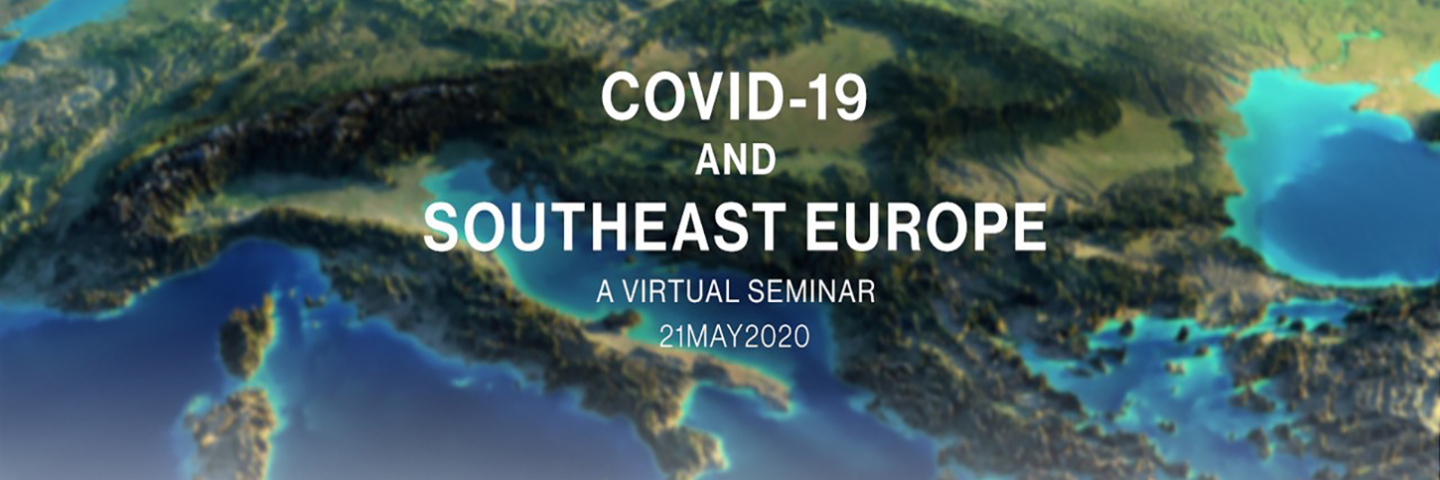
Marshall Center Hosts a Virtual COVID-19 Seminar for Alumni from Southeast Europe
By Christine June
Public Affairs Office
George C. Marshall European Center for Security Studies
GARMISCH-PARTENKIRCHEN, Germany (May 21, 2020) — The outreach program at the George C. Marshall European Center for Security Studies hosted a “COVID-19 and Southeast Europe” Virtual Outreach Seminar with alumni from 11 Balkan countries May 21.
The purpose of this event was to advance mutual understanding of the current and potential effects of coronavirus on the security environment in Southeast Europe, said Dr. Matthew Rhodes, Marshall Center’s professor of national security studies.
“We gathered unique and original information and insight on how COVID-19 is affecting Southeast Europe,” Rhodes said. “It was an informative discussion on how best to come out of COVID-19 in ways that support shared policy objectives.”
This Virtual Outreach Seminar aimed to facilitate the sharing of analysis and perspectives on impacts of the coronavirus on the regional security environment in Southeast Europe.
The seminar built on a related Marshall Center Strategic Insights publication titled COVID-19 and Southeast Europe written by Rhodes and Dr. Valbona Zeneli, chair of the Marshall Center’s Strategic Initiatives Department.
“This virtual seminar was an opportunity for Valbona and me to discuss our new paper on the topic with a group of active alumni from the region,” Rhodes said.
The seminar was divided into three parts with a conclusion segment. Part I introduced the paper, which highlighted political and economic fallout from COVID-19, international engagement, regional relations and looking ahead at the long-term challenges from COVID-19 in Southeast Europe.
Part II consisted of participant feedback and remarks, giving each alumni opportunity to discuss what have been the most significant or unexpected impacts of COVID-19 in their countries, and how COVID-19 has affected them personally or professionally.
Part III was a discussion on what international, regional or national policy measures would be most helpful now and what can the Marshall Center and its alumni do to assist.
Alumni representing Republic of Albania, Bosnia and Herzegovina, Republic of Bulgaria, Republic of Croatia, Hellenic Republic, Republic of Kosovo, Montenegro, Republic of North Macedonia, Romania, Republic of Serbia and Republic of Slovenia participated in this interactive video seminar. They shared and analyzed the current and potential effects of coronavirus on the security environment in Southeast Europe.
“It was especially valuable to hear participants’ perspectives on COVID-19’s impact on their countries, as well as their own personal and professional lives,” Rhodes said. “The feedback will contribute to refining the research, as well as to policy ideas for addressing the situation now.”
Rhodes added that this virtual seminar filled a gap, as the topic has not been covered in a thorough, comprehensive manner elsewhere.
“This event will continue to build background information and networking opportunities for the Southeast Europe Forum series,” Rhodes said. “It will help inform U.S., German, and regional stakeholders about how the coronavirus crisis is perceived within the region, as well as particular challenges and opportunities it may bring for Euroatlantic and intra-regional relations.”